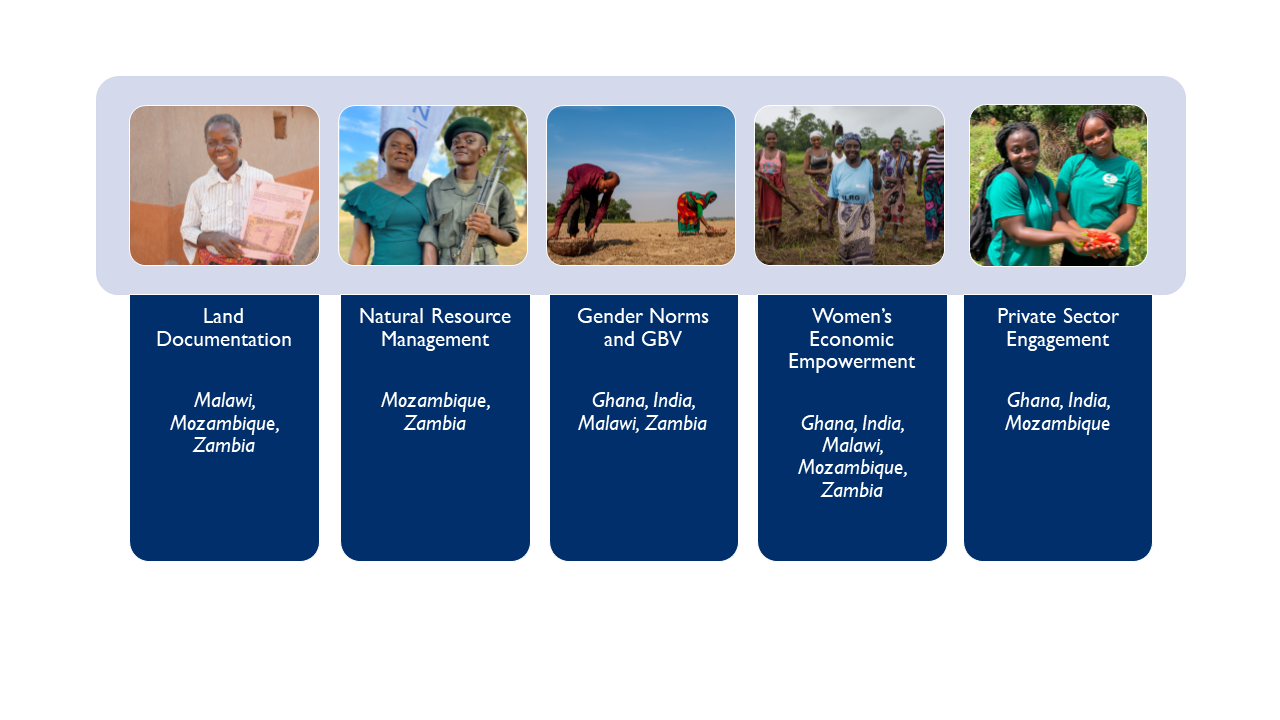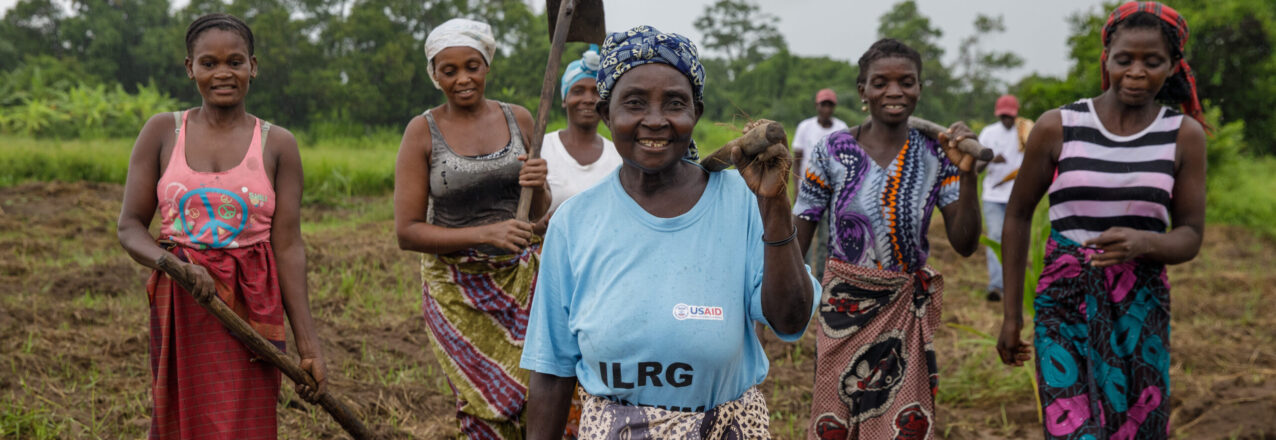Under the Integrated Land and Resource Governance (ILRG) program, a five-year global mechanism (2018-2023), USAID works to increase women’s access, ownership, and use of productive resources, including land and natural resources. With funding from the Gender Equality and Women’s Empowerment Hub (GenDev) at USAID, ILRG undertook a holistic approach to promoting gender equality and social inclusion in its work in Ghana, India, Malawi, Mozambique, and Zambia. This included developing greater understanding of gender and power dynamics, improving women’s access to and ownership of resources, increasing women’s decision making power at the household and community levels, challenging harmful gender norms and behaviors, engaging men as role models and champions, and identifying, mitigating, preventing, and responding to gender-based violence (GBV) risk. ILRG activities to support women’s land rights included inclusive and equitable documentation of land rights, promoting equitable representation in natural resource governance, addressing underlying gender norms and barriers,promoting land-based economic opportunities for women, and engaging with companies to identify and take action on sustainable, market-based approaches to respond to these issues. Resources produced include a number of gender assessments, women’s empowerment and entrepreneurship training, gender norms dialogue facilitation manuals, practice notes on gender integration for customary land documentation, case studies, as well as lessons learned.

Land Documentation:
- Gender and Land in Traditional Land Management Area (TLMA) Mwansambo in Malawi: Gender Assessment (Brief, Report): Assessment of the barriers and opportunities to promote gender equality in land registration and to inform the design of the gender-responsive land documentation activity.
- ILRG Gender Assessment For Zambia and Mozambique Findings and Recommendations for Gender Integration into Activity Design and Implementation, 2019–2021: This initial gender assessment was used to inform the design of early activities in Zambia and Mozambique.
- Mozambique Gender, Youth, and Social Inclusion Assessment: Analysis of youth and gender relationships and their influence on decision-making related to land and land use within families and community land associations in Zambezia province. It was used to inform the design of the work with the private sector partner Green Resources.
- Women’s Land Rights and Economic Empowerment in Cocoa Communities in Ghana – Gender Assessment (Brief, Report): Gender assessment to better understand the key barriers and opportunities for women in cocoa communities and to inform the design of interventions.
- Practical Implementation Guide on Gender Equality and Social Inclusion in Customary Land Registration in Malawi: Practical resource on how to promote gender equality and social inclusion in customary land documentation processes. The target audience for the guide is all stakeholders directly involved in customary land documentation, including government officers, traditional leaders, and international organizations and donors. The document provides a series of short practical technical guidance on gender equality and social inclusion for each specific step, from planning to land certificate distribution.
- Practical Implementation Guide on Gender Equality and Social Inclusion in Customary Land Documentation in Zambia: Practical resource on how to promote gender equality and social inclusion in customary land documentation. The target audience for the guide is all stakeholders directly involved in customary land documentation, including civil society organizations, community leaders, traditional leaders, and international organizations and donors. The document provides a series of short practical technical guidance on gender equality and social inclusion for each step, from planning to land certificate distribution.
- Gender-Responsive Land Administration for Local Authorities in Zambia (Simplified Practice Notes, Full Practice Notes): Provides a set of practical tools for inclusive standard land administration practices that are also gender-responsive. Can serve as a resource to help Local Authorities in the country implement inclusive and effective land allocation and enhance service delivery.
- Lessons Learned: Integrating Gender Equality and Social Inclusion into Customary Land Documentation in Malawi: Summary of 10 lessons from integrating gender equality and social inclusion into the customary land documentation process, highlighting key results, challenges, and recommendations.
- Lessons on Gender, Youth, and Social Inclusion in Zambézia Province, Mozambique (Brief, Report): Analysis findings from the gender assessment in Zambézia province to better understand gender and youth relationships regarding land in a matrilineal context and how they influence decision-making related to land access and use within families and in community land associations.This was used to inform the design of the work with private sector partner Green Resources.
- Women’s Land Rights and Economic Empowerment in Cocoa Communities in Ghana – Gender Assessment (Brief, Report): Gender assessment to better understand the key barriers and opportunities for women in cocoa communities and to inform the design of interventions.
- Report on the 2021 Women’s Land Rights Webinar Series: Summary of presentations and discussion from a women’s land rights webinar series hosted by ILRG Zambia.
- Gender-Based Violence and Land Documentation & Administration in Zambia: Emerging Lessons from Implementation: Summary of key linkages between systematic customary land documentation and gender-based violence related to land ownership, access, and control, with recommendations for future programing.
Natural Resource Management:
- House of Chiefs Gender Guidelines for Traditional Leaders in Natural Resource Management in the Chiefdoms (Zambia): A set of practices for strengthening women’s land and resource rights within Zambia’s 288 chiefdoms and providing traditional leaders with tools to encourage gender equality in policies and activities at the local level. The guidelines are the result of a multi-year partnership between ILRG and the Zambia House of Chiefs to promote women’s land rights, address harmful gender norms, and increase women’s participation in natural resource management.
- Brief: Gender-Based Violence in the Natural Resource Sector in Zambia: Summary of the main forms of gender-based violence (GBV) experienced by women in natural resource community governance and in wildlife law enforcement, describing how violence occurs both in private and public spaces, perpetrated by different people and institutions. The brief also describes how the ILRG activity has worked to mitigate these GBV risks while empowering women to take on leadership positions in natural resource governance.
- Increasing Women’s Participation in Community Resources Boards in Zambia (Brief, Report): Summary of the strategies used and the outcomes in the gender-inclusion community resource board elections supported under ILRG. It reflects on lessons learned, challenges, and opportunities for scaling the approach.
- Strengthening The Capacity of Traditional Leaders to Champion Gender Equality in Zambia Lessons Learned Piloting Gender Guidelines for Natural Resource Management: Reflections on ILRG support to the House of Chiefs on integrating gender into natural resource management, including the drafting and piloting of the Gender Guidelines.
Gender Norms and GBV:
- Gender Norms and Women’s Land Rights Brief: Key concepts related to harmful gender norms and the linkages between gender norms and women’s land rights, introducing an approach to identify and shift harmful norms in the context of land and natural resources.
- Simplified Training on Gender Norms Dialogue Sessions for Customary Land Committee Members in Malawi: Manual to facilitate light-touch dialogues on harmful gender norms with women and men elected to land governance structures.
- Gender Norms Dialogue for Traditional Leaders in Malawi Training Manual: Manual to facilitate a three-part dialogue process with traditional leaders so they can identify harmful norms that hinder women’s land rights and devise their own solutions to start shifting these norms.
- Training Manual for Household Dialogues on Gender Norms in the Context of Land Rights in Malawi: Manual dialogues to facilitate dialogues on harmful gender norms at the household level, where most decisions about ownership, access, control, and disposal (including inheritance) of land are made. The curriculum focuses on harmful norms related to access to resources, gendered division of labor, gendered decision-making, and gender-based violence.
- ECOM Ghana Good Social Practices and Gender Norms Training Manual: Facilitation guide for facilitating household gender norms dialogues that bring men and women together to discuss harmful gender norms related to access to resources, gendered division of labor, gendered decision-making, and gender-based violence.
- Gender Norms and Land: Identifying and Shifting Harmful Norms to Strengthen Women’s Land Rights: Final report summarizing gender norms change work across Ghana, India, Malawi, Mozambique and Zambia.
Women’s Economic Empowerment:
- Women’s Empowerment and Leadership Training Manual for Women in Customary Land Committees in Malawi: Facilitation manual to deliver participatory training for women in leadership positions in land governance structures. The curriculum focuses on technical and socio-emotional skills to enable women to effectively and meaningfully exercise their leadership role.
- Women’s Leadership and Empowerment Training Manual for Community Natural Resource Governance in Zambia: Manual to facilitate participatory training for women in leadership positions in the natural resource sector. The curriculum focuses on technical and socio-emotional skills to enable women to effectively and meaningfully exercise their leadership role in community resource governance and management. The manual is developed for community facilitators to support women in community leadership positions or those intending to get into community leadership.
- ECOM Ghana Women’s Empowerment and Entrepreneurship Training Manual for Women in Cocoa Farming Communities: Facilitation guide for providing participatory training on empowerment skills, entrepreneurship, and financial literacy for women.
- Working with Community Agronomists to Reach Women Farmers: Outcomes and Lessons Learned (Brief, Report): ILRG hired 17 women from local communities to work as part time community level agronomists to increase outreach and engagement with women farmers. This report shares lessons learned from this approach and the viability of this model for other private sector partners.
- Self-Help Group Land Leasing: Outcomes and Lessons Learned (Brief, Report): ILRG worked with existing women’s self-help groups to help them collectively lease land to enable them to enter PepsiCo’s potato supply chain as independent producers. This report shares lessons learned from this approach and the viability of this model for other private sector partners.
Private Sector Engagement:
- Gender, Youth, and Social Inclusion in Access to Land and Economic Opportunities (English, Portuguese): Analysis of the gender, youth, and social inclusion barriers and opportunities in Zambezia province to inform interventions in partnership with Grupo Madal.
- PepsiCo – Integrating Women Smallholder Farmers into International Supply Chains: Case study in private sector partnership between PepsiCo and USAID in India.
- Grupo Madal – Securing Women’s Rights to Productive Land: Case study on private sector partnership between Grupo Madal and USAID in Mozambique.
- Green Resources – Responsible Private Sector Divestment: Case study on private sector partnership between Green Resources and USAID in Mozambique.
- Women’s Land Rights and Economic Empowerment in Cocoa Communities in Ghana: Final report on ILRG Ghana women’s empowerment work, with key results, lessons learned, and recommendations.
- The Business Case for Women’s Economic Empowerment in PepsiCo’s Potato Supply Chain in West Bengal: Key Results and Recommendations: Final summary brief on ILRG India work with PepsiCo, including key results and recommendations for both USAID and the private sector.
- The Business Case for Women’s Empowerment in the PepsiCo Potato Supply Chain in West Bengal, India – Final Report: Final report on ILRG India women’s empowerment work with PepsiCo.
- Exploring An Ingrower/ Outgrower Model with Grupo Madal in Zambezia, Mozambique: Activities, Results & Lessons Learned: Final reflections on private sector engagement with Madal.
- Final Green Resources lessons learned brief (forthcoming)
- Lessons Learned: Private Sector Engagement on Land and Gender: Reflections on eight private sector partnerships across ILRG, including why the private sector is interested in engaging on land and gender issues, implementation approaches, and lessons learned.


